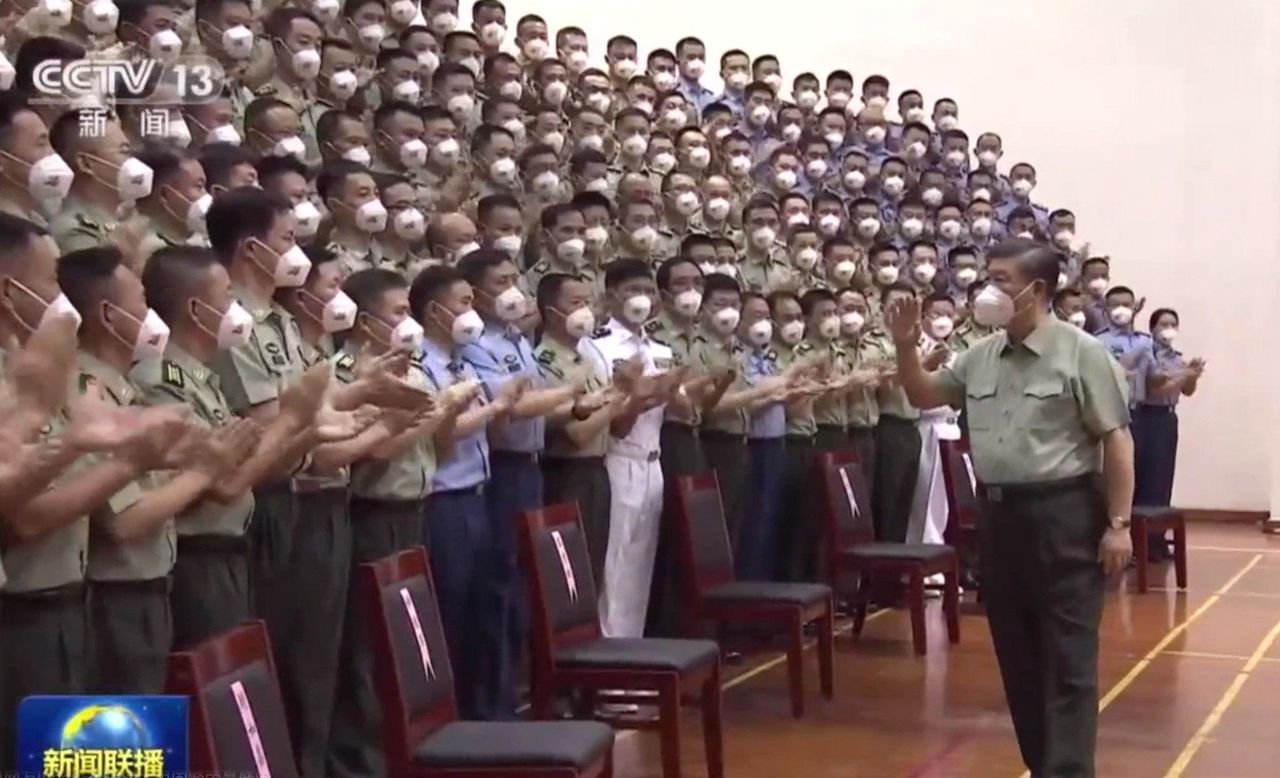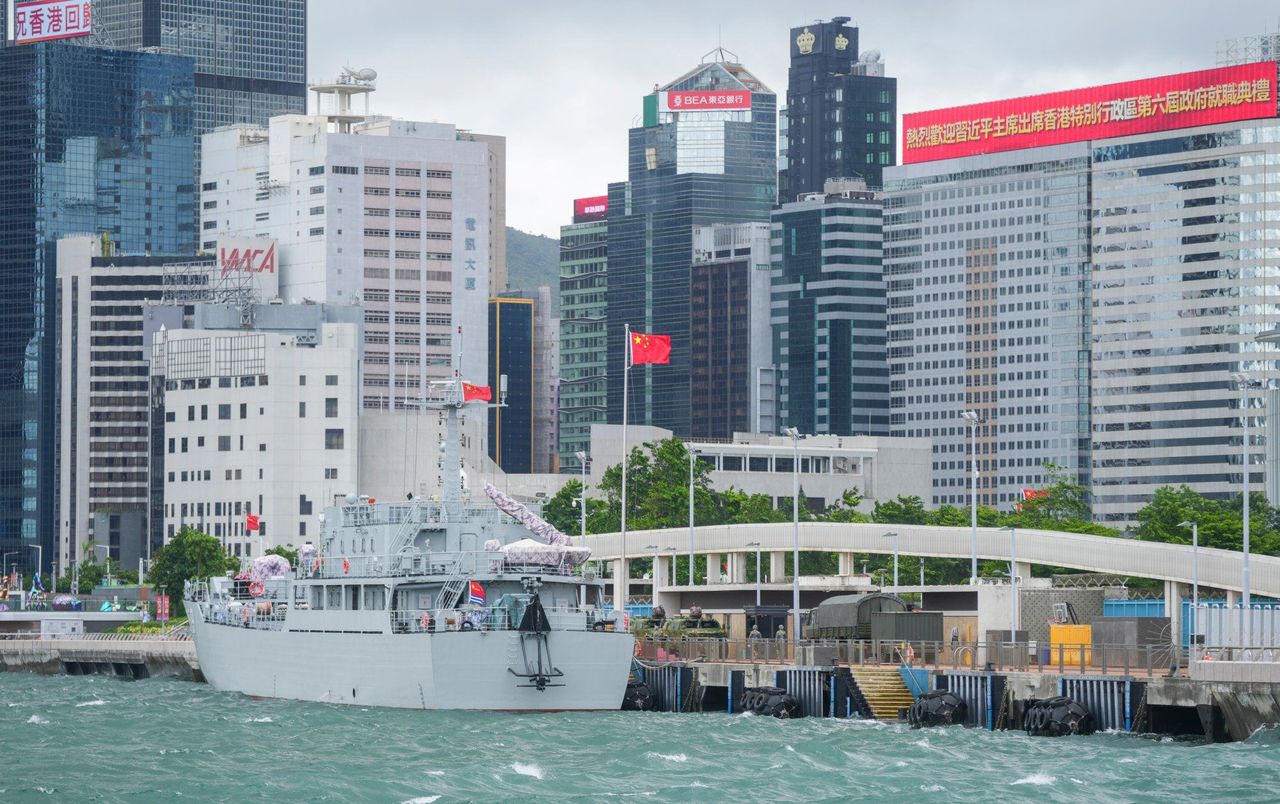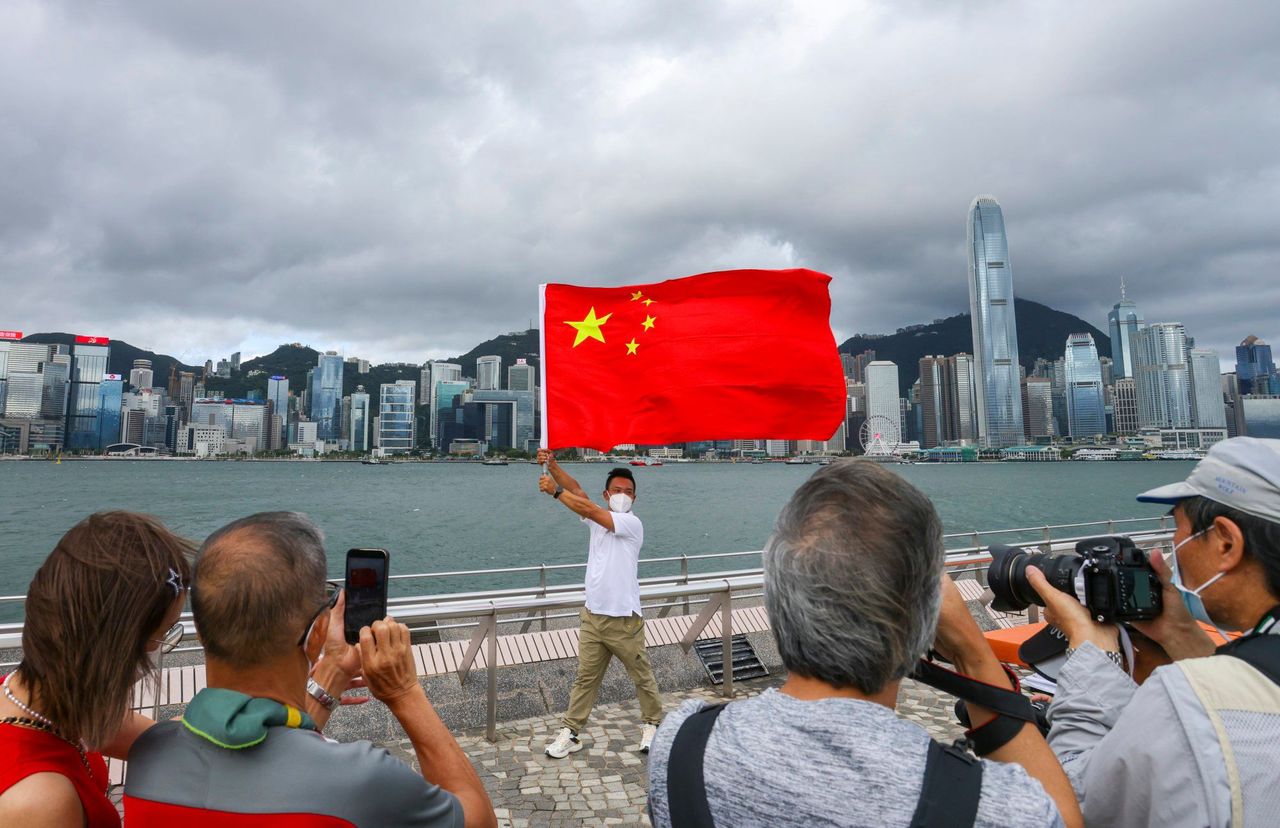Hong Kong News

Beijing committed to ‘one country, two systems’ principle for Hong Kong: Xi
Chinese President Xi Jinping has promised Beijing’s long-term commitment to maintaining the “one country, two systems” governing principle for Hong Kong and preserving its unique strengths as an international hub, while also laying down a list of tasks for the city’s new leader to deliver in the next five years.
Xi swore in Chief Executive John Lee Ka-chiu and his new team on Friday, instructing them to improve governance, strengthen the momentum of development, solve deep-seated livelihood issues, and ensure harmony as Hong Kong “cannot afford any chaos”.
The president set out the direction for Hong Kong’s future development in the clearest terms yet and listed his expectations for the new administration at the main ceremony marking the 25th anniversary of the city’s handover from British colonial rule to Chinese sovereignty.
 President Xi Jinping with the Hong Kong garrison of the People’s Liberation Army on Friday.
President Xi Jinping with the Hong Kong garrison of the People’s Liberation Army on Friday.
He also inspected the Hong Kong garrison of the People’s Liberation Army and praised it for playing an important role in the city’s “transition from chaos to stability”, before concluding his two-day visit and returning to neighbouring Shenzhen on a special train via the cross-border express rail link.
“There is no reason to change such a good system. And it must be adhered to in the long run!” Xi said in his keynote speech at the swearing-in ceremony, underscoring Beijing’s commitment to the unique governing formula that allows Hong Kong to maintain its own capitalist system and enjoy a high degree of autonomy.
But he also reminded the city of the central government’s overall jurisdiction while calling for the policy to be “applied fully and faithfully without being bent or distorted”.
“The policy of one country, two systems is an integral whole. Upholding our country’s sovereignty, security and development interests is the paramount principle in the policy of one country, two systems,” he said.
At the same time, the president reminded all Hongkongers to “conscientiously respect and uphold” the fundamentals of mainland China’s socialist system.
 Xi Jinping has assured Hong Kong of Beijing’s full, long-term backing for the city’s unique status and strengths.
Xi Jinping has assured Hong Kong of Beijing’s full, long-term backing for the city’s unique status and strengths.
Xi stressed that there should be no compromise on the principle of “patriots administering Hong Kong”, which Beijing used to overhaul the city’s electoral system last year in response to the anti-government protest chaos and political turmoil of 2019.
“Keeping political power in the hands of patriots is a political rule commonly practised in the world,” he said. “No people in any country or region in the world will ever allow political power to fall into the hands of forces or individuals who do not love, or even sell out, or betray, their own country.”
The president assured Hong Kong of Beijing’s full, long-term backing for the city’s unique status and strengths, as well as its free business environment. He spoke about consolidating Hong Kong’s role as an international financial centre and, on a significant note, recognised the need to preserve the city’s common law system, all to contribute to the “rejuvenation of the Chinese nation”.
The next five years would be “crucial for Hong Kong to break new ground and launch a new take-off”, he said as he listed the tasks ahead for the new local government.
He urged the new chief executive to improve governance and boost its efficacy, while also calling on officials to strengthen their sense of national identity and global vision.
“The relationship between the government and the market should be better balanced, so as to better promote a well-functioning government and an efficient market,” he said.
In addition to fostering closer cooperation with the mainland and the world, he continued, Lee’s new administration should address difficulties in people’s lives.
 President Xi has urged new city leader John Lee and his team to uphold
social harmony and stability, and promote patriotism and national pride
among the city’s youth.
President Xi has urged new city leader John Lee and his team to uphold
social harmony and stability, and promote patriotism and national pride
among the city’s youth.
“At present, what the people of Hong Kong desire the most are a better life, a bigger apartment, more business start-up opportunities, better education for kids and better elderly care,” he said, breaking it down for the first time in such detail.
“The new government … should deliver concrete outcomes and live up to people’s expectations, give top priority to meeting the aspirations of the whole community, especially ordinary people, and act with greater resolve and take more effective steps to address existing problems so that more fruits of development will reach all people in Hong Kong in a more equitable way.”
The president urged Lee and his team to uphold social harmony and stability, and promote patriotism and national pride among the city’s youth.
“In particular, we should care about the young people,” he said. “When the young people thrive, Hong Kong thrives. When the young people grow, Hong Kong grows. When there is a future for the young people, there is a future for Hong Kong.”
Although he did not refer directly to the 2019 crisis, Xi cited the Chinese saying that “harmonious families will always prosper” as he added: “Having gone through ups and downs, people have learned the hard way that Hong Kong must not be destabilised and cannot afford any chaos.”
China watcher Johnny Lau Yui-siu noted the significance in Xi urging Hongkongers to respect the Communist Party’s rule as the foundation of the nation’s socialist system.
“They may have been wondering all along why it has been so hard to rule Hong Kong and they may be thinking that it could be due to Hong Kong people’s lack of understanding of the country,” Lau said.
He also noted that Xi had spoken at length on youth development this time, and suggested the president saw it as a problem stemming from a lack of national education among the younger generation.
Lau Siu-kai, vice-president of semi-official think tank the Chinese Association of Hong Kong and Macau Studies, comparing the president’s speech on Friday with the one he made five years ago, said this time the focus was more on the importance for Hong Kong to grasp opportunities during the coming five years of transition.
“This is why [Xi] laid down more urgent and explicit expectations on the new administration,” Lau said. “He expects the administration to improve governance quality and style … and dare to overcome obstacles from vested interests so that Hong Kong can accelerate its integration into the development of the country.”
Lo Kin-hei, chairman of the opposition Democratic Party, said the new administration should listen to dissenting voices if it hoped to improve governance.
He said a concern behind Xi’s firm goal to “keep the power to administer Hong Kong firmly in the hands of patriots” was the ambiguous definition of the term “patriot” in the eyes of Beijing.
“We have always firmly adhered to the one country, two systems principle. But past incidents have proved that the goalposts are being moved from time to time when determining whether one is qualified [for public office],” Lo said.
Chief Executive Lee said Xi’s remarks had boosted people’s confidence in the successful implementation of one country, two systems, and his team would not let the president or the public down.
There were no disturbances during Xi’s visit under a massive security blanket, but in an isolated incident, police on Friday arrested a 30-year-old man for possession of a card knife near the West Kowloon high-speed rail terminus, shortly after Xi arrived at the station to return to Shenzhen.
Police said they had arrested three others over the past three days for criminal damage, obstruction of public places and violating a ban on flying drones.











